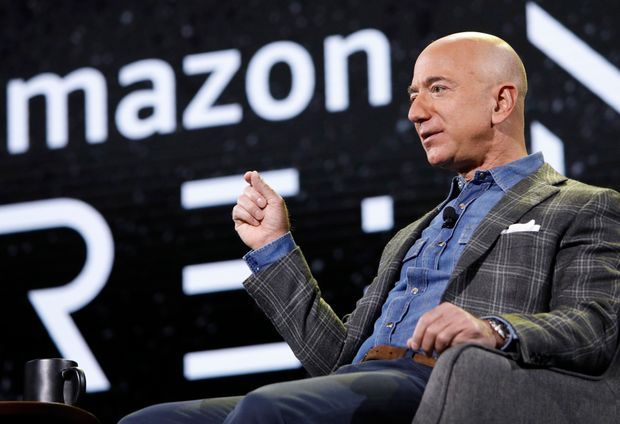It's always Day 1 ...
Lessons from Jeff Bezos • April 25, 2021
Things we learned from Jeff Bezos ...

Jeff Bezos' letters to Amazon.com shareholders are a master class in thinking about business, investing, and life. Bezos' letters are a fascinating window into key moments in Amazon's history, such as the IPO, the dot-com crash, and the launch of Prime and Amazon Web Services (AWS), as seen through the eyes of the company's visionary leader. It's instructive to see how Bezos' consistent focus on a few core principles has fueled Amazon's incredible success.
In his final letter as CEO (Bezos will transition to a role as executive chairman later this year), Bezos seemed motivated to defend Amazon's reputation and perhaps his personal legacy. He addressed several of the most common criticisms of the company by stressing the importance of creating value for all stakeholders and establishing the lofty goal of being "Earth's Best Employer and Earth's Safest Place to Work." And Bezos closed with a beautiful plea to embrace your uniqueness despite the difficulty.
The world wants you to be typical — in a thousand ways, it pulls at you. Don't let it happen. You have to pay a price for your distinctiveness, and it's worth it.
We encourage you to read Bezos' letter for yourself and perhaps browse through letters from previous years to soak up some of the timeless principles that have made Amazon so successful (good news: they're pretty short!). To whet your appetite, here are three of our top takeaways from Bezos' previous letters:
1. Focus on the Long Term and Measure What Matters
From day one, Amazon has focused on the metrics that Bezos believed would lead to long-term success: customer satisfaction, brand strength, and revenue growth. Bezos knew that scale was essential to leveraging the power of Amazon's business model. By offering the widest selection of products at the lowest prices, Amazon would attract more customers to its site. The revenue from these customers would enable Amazon to lower prices further and invest to improve the customer experience, which would attract even more customers, and so on...
Wall Street analysts used to ridicule these investments because they depressed Amazon's earnings. For years, the conventional wisdom was that Amazon would never make money. But Bezos believed this approach was the best way to maximize long-term shareholder value, and he kept Amazon focused on the metrics that mattered instead of playing Wall Street's game.
We will continue to make investment decisions in light of long-term market leadership considerations rather than short-term profitability considerations or short-term Wall Street reactions.
When forced to choose between optimizing the appearance of our GAAP accounting and maximizing the present value of future cash flows, we'll take the cash flows.
2. Make Big Bets on Bold Ideas...and Don't Fear Failure
Swinging for the fences has been key to Amazon's success. Sure, there have been a few strikeouts along the way (remember the Fire Phone?), but those losses pale in comparison to home-run successes like Marketplace, Prime, and AWS.
This is reminiscent of David Gardner's investing strategy, in which outperformance comes primarily from a few multibaggers (including Amazon!). David likes to point out that the most a stock can decline is 100%, but a long-term winner can increase 10 times or more.
Given a ten percent chance of a 100 times payoff, you should take that bet every time. But you're still going to be wrong nine times out of ten.
Most large organizations embrace the idea of invention, but are not willing to suffer the string of failed experiments necessary to get there. Outsized returns often come from betting against conventional wisdom, and conventional wisdom is usually right. ... Big winners pay for so many experiments.
3. It's Always Day 1
Amazon's success stems from its "Day 1" mentality. Although it is among the most powerful companies in the world, Amazon still strives to maintain the culture of an agile and scrappy start-up. That means making quick decisions with incomplete information, correcting course as necessary, learning, and adapting.
The core principle behind Amazon's "Day 1" approach is a customer-obsessed culture. Amazon is perpetually driven to improve its services, lower its prices, and increase customer value. While the company could easily rest on its laurels, this "Day 1" mentality drives innovation and ensures that Amazon stays steps ahead of its competitors.
Day 2 is stasis.
Followed by irrelevance.
Followed by excruciating, painful decline.
Followed by death.
And that is why it is always Day 1.
Staying in Day 1 requires you to experiment patiently, accept failures, plant seeds, protect saplings, and double down when you see customer delight. A customer-obsessed culture best creates the conditions where all of that can happen.

Around 50% of all consumers in the US hoping to buy something online will end up on Amazon.com. This explains why the Amazon Marketplace has more than 6.3 million sellers. Out of these sellers, 1.5 million are active. According to the Jungle Scout’s 2021 State of the Amazon Seller, 21% of Amazon sellers plan to “launch their own e-commerce store.” If you’re already an Amazon seller, you can join this 21%, diversify your business, and make more money. But how do you do that? This is the question we want to answer in this article. Before we present the steps you can follow to launch your e-commerce store, let’s start by looking at some of the benefits of launching your own online store. Why Is It Important for Existing Amazon Resellers to Have Their Own Stores? If you are already successfully selling on Amazon Marketplace, you have certainly gained valuable e-commerce experience serving a large consumer base. Consequently, starting your own e-commerce store seems like a natural progression as you scale your business. Gonzalo Gil wrote a comprehensive article published by the e-commerce software provider, Shift4Shop.com, providing reasons Amazon sellers should open their own online stores. A summary of these reasons is presented below: Building your brand: When customers buy from you on the Amazon Marketplace, they believe they are buying from Amazon and are less likely to become loyal to you as a seller or your brand. Having your own e-commerce store could help you build a brand and loyal customer base. Maintain a database of customers: Your customers on Amazon Marketplace are Amazon customers; hence you can’t build a relationship with them or use data collected from them for improving your offer. From your own site, you access your customers and engage with them. Sell what you want: Amazon has restrictions on what you can sell, particularly services that compete with Amazon’s. With your own e-commerce store, you can sell whatever you want, as long as it is legal to do so in the area where you operate. Operate your business the way you want: When you sell on Amazon, you have to agree to the company’s terms and conditions. Having your own e-commerce store allows you to decide what works and what doesn’t work for your own business. Amazon May Be Using Your Data to Launch New Products Another reason you may want to launch your own e-commerce store is that you want peace of mind that Amazon is not using your data to launch products that compete with yours. Does Amazon really collect data from sellers to determine products that are selling well and then launch its own products of the same kind? According to Dana Mattioli, writing for the Wall Street Journal, the answer is yes. Mattioli writes, “Amazon.com Inc. employees have used data about independent sellers on the company’s platform to develop competing products, a practice at odds with the company’s stated policies.” This is an accusation that Amazon disputes. CNBC.com quotes a statement from the company: “While we don’t believe these claims are accurate, we take these allegations very seriously and have launched an internal investigation.” Now that you know the benefits of having your own e-commerce store, let’s look at the steps you can follow to create one. 1. Do Your Homework Starting a business involves making critical choices about several elements. However, to make the right choices, you will need to have sufficient information. That information can only be obtained by researching your business idea. Amazon lists questions that should form part of your research: What problems or pain do you wish to solve in your own life? What flaws or complaints do you have about the products you are currently using? Visit online forums. What prevailing trends can you capitalize on? You can use software that identifies the main terms customers are searching for and then use the relevant keywords when creating content. What do your friends and family members say about products they use? Which products would help improve the services you like and use the most? Using these questions, you can create a business plan that should include matters related to compliance and taxes in the area where you operate. 2. Identify the Potential Customer For your e-commerce store to succeed, you will need to attract customers and get them to buy. However, it will not be possible to attract a customer you have not clearly defined. When you have as much information about your target customer as possible, you will know what they can afford. You will also determine the methods to attract such customers because you know where to find them. When it comes to determining the price point, the online digital marketing resource for digital marketers, QuickSprout.com, advises that you should “Avoid any product category with too low of a price.” QuickSprout.com also suggests that when you select a product whose price and profit margin is too low, you will need to sell hundreds of thousands of products every year to be sustainable. As you may expect, this is not an easy task to accomplish. 3. Choose a Business Name and Register a Domain With all your research done and the customer identified, it’s time to decide on the name that will appeal to that customer. Identify a business name that speaks to your potential customer base. Based on that name, you will also register a domain. Selecting a business and domain name is something that you need to put substantial energy into. This is a view acknowledged by Mailchimp, the American email marketing company. Mailchimp says, “Your domain name is more than just the internet address where people can find your store—it’s the online identity of your business.” 4. Choose Your E-Commerce Type You will also need to determine which type of e-commerce business you want to establish. BigCommerce.com identifies four business models you can consider: Business to consumer (B2C): Involves selling products to the end-user. While this business requires less investment to attract a sale, recurring orders and profit margins are lower. Business to business (B2B): In this model, a business sells its products and services to another business. While decision-making in the B2B model takes longer, purchases tend to be recurring and involve higher prices and profit margins. Consumer to business (C2B): This makes it possible for individuals to supply services and goods to businesses. This is a model that’s primarily ideal for services like web design, marketing, or writing. Consumer to consumer: Allows consumers to sell to each other. However, this model faces challenges regarding scams and product quality. 5. Identify a Platform for Your E-Commerce Store When you select a hosting provider for your e-commerce store, you have two choices. You can create a website that will host your e-commerce store on your own domain. The other option is to find existing e-commerce sites, like Shopify, Amazon, and Big Commerce and use them to anchor your store. 6. Source Products for Your E-Commerce Store Now we get to the more challenging stuff. With millions of companies supplying goods across the world, getting the right quality can be a considerable challenge. Your life will be easier if you find the best sourcing agent in your niche. Amazon suggests that “Good products will help your new online business thrive.” Adding, “The key is not only choosing the right product but the right source for your products.” When you add products to your online store, the most crucial element is ensuring that the customer can navigate the site easily. If customers need to click many times to get a product, they will be frustrated and leave. 7. Determine How You Will Process Payments If not handled with care, payment processing could be your weakest link. When customers are asked to enter confidential information like card numbers, they will need assurance that your site is trustworthy and their information will not end up in the wrong hands. When it comes to processing payments, the good news is that several third-party providers can manage the process securely for you. Specific companies you can work with include PayPal, Stripe, Square, and Amazon Pay. 8. Handle Order Fulfillment Once the customer has trusted your e-commerce store enough to place an order, they don’t expect problems with order fulfillment. Reliable order fulfillment helps you build credibility, get good reviews, and garner respect from your customers. This will amplify your growth potential. In terms of fulfillment, you can choose either dropshipping or third-party logistics (3PLs). When you choose dropshipping, you manage the sales process, and the supplier delivers the product to your customer. It’s important that you partner with the best dropshipping agents available to ensure the smooth flow of your products from a warehouse to your customer’s doorstep. On the other hand, when you work with 3PL fulfillment services, they are the ones that make sure the products are delivered into the customer’s hand in a smooth manner. These services receive the products, package them, and store them before transmitting them to the customer. In this case, you need to find the best fulfillment services to manage the entire supply chain in the best way possible. 9. Manage Marketing, Social Media, and Reviews Your product may be great, but it will not sell if those who need it don’t know about you. This is the reason you need to focus on marketing your products using different methods. One of the least expensive methods of marketing your products is through social media. Amazon suggests that “Given the vast majority of consumers that frequent social media websites every day, adding one or two social media channels to your promotions and outreach can help drive brand and product awareness.” Every customer that decides to write a review is an asset to your e-commerce store. Those who write great reviews show you what is working, while those who write bad ones are helping you improve. If you don’t appreciate the importance of reviews, you probably haven’t seen the statistic by BigCommerce.com: “Customers are likely to spend 31% more on a business with ‘excellent’ reviews.” 10. Evaluate and Act We may have listed these steps in a simple way, from one to ten, but in reality, the process is not always linear. It is vital to evaluate what is and what is not working at every step of the process. This will help you take the necessary actions that will allow your e-commerce business to scale up. For additional links & resources, go to the original article on sourcingbro.com

The benefits of remote work, when logistically feasible, are immense. Employees have more flexibility with their day, and employers have found that employees tend to work longer. It has forced employers to rethink the future workplace. But there are drawbacks. Employees are human and humans are generally social creatures. Due to limited social interaction, a number of studies are concluding that this new work environment is dumbing us down. “Zoom fatigue” is widely prevalent as people grow tired of the lack of human interaction. New research from Carnegie Mellon also suggests that using Zoom for team interactions may not be particularly effective and might actually be making our teams less intelligent. When working in a team, it generally allows for the best effort in collective intelligence, which is the ability of a group to solve a wide range of problems. With the use of virtual teams, it lessens the collective intelligence, according to the study. Although technology can replicate face-to-face meetings, it does not allow for non-visual communication, which may be more important for participants in a meeting when linked with audio cues. Thereby collective intelligence is negatively impacted by the failure to see or recognize these cues that would be apparent in a live meeting. “We found that video conferencing can actually reduce collective intelligence,” the Carnegie Mellon researchers say. “This is because it leads to more unequal contribution to conversation and disrupts vocal synchrony. Our study underscores the importance of audio cues, which appear to be compromised by video access.” Other research from MIT has demonstrated that the ability to empathize and interact with others is key to successful teamwork, but is difficult to measure online as participants may not have access to in-person cues. Eye contact is important whether in live or video meetings. If having a video meeting, it is important that all participants have their camera on. Research from Tampere University in Finland highlights the importance of eye contact for collaboration. The study found that eye contact during video calls triggers the same kind of psycho-physiological responses as eye contact face-to-face. The findings emerged after the researchers examined the physical reactions to eye contact in a range of situations, including face-to-face and via a live video call. However, since a team meeting is generally more than two people, eye contact may be generic as opposed to specific to the conversation at hand. Research from Florida Atlantic University reveals that a participant’s gaze is often altered during video conferencing, precisely because they believe the other person can see them and they always have to be “on.” Studies have shown that people are highly sensitive to the gaze direction of other people. Therefore, eye contact could be minimalized, and those social clues are somewhat dismissed given the circumstances. If everyone isn’t using their camera, that puts people at a disadvantage. They may assume that the team member off camera is not participating, maybe doing other things, and not taking the discussions seriously. As a result, this could lead to more conflict among team members, increased resistance to ideas, and reduced collective intelligence. Therefore, it is important to have set rules in place for all video or remote meetings, and unless there is a good reason otherwise, all team members must follow and participate in the same way. Electronic device fatigue is real, as is electronic device addiction (do you keep your cellphone on at the dinner table?). When rethinking the workplace, employers must also rethink the workforce and their interaction among each other.

One (or two) questions that have been brought to ASE by employers when requesting a review of their employee handbook over the last year has been, do we need a COVID-19 policy? And/or what other policies do I need to have in place given the pandemic? Before I go any further, I want to firmly state, employers should be communicating the heck out of new policies and practices resulting from workplace changes driven by the pandemic. In particular, employers should be “screaming” their new COVID-19 safety and health policies and rules to employees working on-site. They should also be repeatedly stating how employees should comply with communications directives and what is expected from them if working from home. Communicate, communicate, communicate. Then communicate some more. To move quickly, these policies can be put out in memos, postings, or emails. To respond specifically about what policies should be added to an employee handbook, my recommendation has been a bit more reserved. One suggestion is to add a policy on Communicable Diseases. A second suggestion, if you foresee continuing remote work after the pandemic, is to also add a Remote Work/Telecommuting policy. Why only those two modest policy suggestions? Because most employers do not update their employee handbooks as often as they should. Therefore, a Communicable Disease policy can be drafted broad enough to address everything from the common cold up to what we are dealing with today – Coronavirus/COVID-19. A specific policy for just COVID-19, as you can easily imagine, will be shortly outdated and its safety and health specific information related to just that disease are changing quicker than most handbooks normally get updated. Use other means to communicate the ever-changing safety and health details. Outside of the handbook, what should be communicated about today’s pandemic? ASE provides a host of policy communications relevant to the current pandemic in our Contagious Diseases and Pandemic Toolkit, available on the ASE Member Dashboard. We are also a Protect Michigan Commission business partner. As we enter the inoculation stages of this pandemic, Michigan has developed and has available for download a number of employee communications pieces that can be used to communicate important and accurate information about vaccination. Those communication pieces need to be communicated quickly. Employers are invited to go to the Communications Toolkit at the Michigan Department of Health and Human Services (MHDDS) site at Michigan.gov/COVIDVaccine. The toolkit has multilingual graphics, videos, posters, and handouts that employers can use to get the word out to workers and their families about the COVID-19 vaccine and when and how to receive the inoculation. The other policy resulting from this pandemic that will probably stand the test of time (or at least until the next handbook update 2- 4 years down the road) is a Telecommuting or Remote Work policy. Most employers already had adopted a remote work program. What has changed is that it was once seen as a progressive, work-life balancing program, today it is now a virtual (pun intended) necessity for most employers. The conventional wisdom is that significant segments of employer jobs can be performed (to at least some extent) from home and beyond. One other policy area that employers will have to embrace in the new remote workplace is cyber security. Workers push and pull information (data) from a what is believed to be a reasonably secure worksite out into every nook and cranny employees take their connected and possibly unsecured electronic device to. Ponemon Institute reports the average cost of a data breach is $3.86 million. At this point, most employer handbooks should have some fashion of Electronic Communications policy included in it. This is another employment handbook policy that employers will probably need to shore up going forward. Most small employers’ handbooks have some policies addressing computer or internet security. Larger more mature businesses have extensive policies on the use of company computer and other equipment. Employers should review their current Electronic Communications policies and practices to determine if they are secure enough. The normal employee is not going to assume or even know if the electronic devices they use everyday are secure enough to use for sensitive data. Employers working with their IT department or vendor should develop an effective policy for its workplace that will embrace the security risk they face when employees work remotely. Don’t get caught! Epidemic orders and MiOSHA require all businesses that are permitted to require their employees to leave the home or residences for work must have a COVID-19 Response and Preparedness Plan.

As a rule, small business owners should regularly assess what they do and how they can do it better. Indeed, there are tons of opportunities for small businesses to grow and flourish, even with an ever-changing world and economy. By implementing the following simple changes into how you run your business, courtesy of the Belleville Area Chamber of Commerce, you may just be looking at your best year yet. Bank smarter. Most small business owners open their business bank accounts early on — as they should. But considering what your business is now instead of what it was then, it’s a good time to re-evaluate your needs when it comes to banking. Ideally, small business bank accounts should provide high-yield interest, free instant deposits, little to no transfer fees, and tons of other features that make banking for your business the easiest part of your day, including integrating with your payroll software. Smoother banking gives you more time to focus on your business, so it’s worth giving yours some thought. Protect yourself. With insecure markets and economies that seem to keep changing these days, there’s really no such thing as ‘total’ security in business. Take the time to see how you can protect your personal assets from those of your business. Consider forming an LLC to limit your liability, reduce paperwork, and provide tax breaks. The additional peace of mind will go a long way. Overhaul your records. There are tons of records that need to be kept for small businesses to really thrive. From tax documents to invoices to payroll, you need to be able to find these documents when needed without having to upend your office. So take some time to create an organization system that will serve you in the future and make tax time a breeze. As a tip: Put in time at the end of every week to tidy up your files and see how much easier it is to maintain your paperwork year after year. Create a web presence. These days, being available online is a must for most modern businesses. There are countless platforms that will help you build your own website , get started in ecommerce , and even start email campaigns to reach out to your loyal customers. By connecting online, you can keep your business thriving and even cast a wider net, no matter your budget. Assess your goals. Having specific goals will help you steer your business in the direction you want and make choices that align with your vision for the future. Go back to the drawing board on a regular basis and come up with goals for this quarter, this year, and maybe even further into the future. From growing your customer base to selling more products or services, the choices you make should reflect how you want your business to grow. And by re-evaluating your goals regularly, you can find new opportunities and break out of habits that no longer serve you. Make connections. There are so many local resources for small businesses, so there’s no benefit to going at it alone. Instead, see what organizations in your area support and connect other local businesses, such as the Belleville Area Chamber of Commerce. Chambers are dedicated to providing resources, networking opportunities, and supporting local businesses. When leveraged right, your membership can do plenty in helping your venture succeed. No matter what your business goals are, these six simple yet effective measures will only serve your business in positive ways. The Belleville Area Chamber of Commerce is also ready to help your small business grow and flourish in the local economy. Join the chamber today.

The events of early 2020 forced most companies to quickly adjust to new challenges. Now, almost a year later, many are still laboring in this "new normal" environment -- increased safety precautions, scaled-down teams and empty offices. With teams scattered geographically and connection opportunities often limited to computer screens, now is a great time for leaders to check in on their workplace culture. Culture is the optimal performance driver. It is an unsigned contract between an organization and its employees that gives individuals license to accomplish goals and get things done without the burden of worry or uncertainty about negative repercussions. And every employee in an organization has the power to amplify or detract from its culture. There are endless definitions of the word culture itself. Gallup believes that organizational culture simply comes down to "how we do things around here." Confidently displaying, for the world to see, how work gets done in your organization informs how employees and customers alike perceive and choose to interact with you. Given this, it may bewilder you to find out that when Gallup talks to executives at organizations that have incredibly strong brands, they often sheepishly admit they don't even know what their culture is. They cannot express in words what their current or aspirational culture is supposed to be. Gallup believes that organizational culture simply comes down to "how we do things around here." Culture is often an unwritten code. Unfortunately, when leaders don't have a clearly defined or codified culture, their vision can be easily overlooked or inconsistently interpreted across the organization. The consequences of an inconsistent, unclear workplace culture can be dire because front-line managers and employees ultimately create the local culture on their teams. If employees don't understand leaders' vision for the culture, their actions won't support -- or worse, will inhibit -- that ideal culture. This can result in a work environment that is chaotic and disengaging, where employees feel creatively stifled and leaders struggle to realize their strategic aims. You might think that you don't need to define and communicate a certain standard culture across your organization -- that uniqueness is a part of your culture and different corners of your organization require different cultures to succeed (e.g., your sales culture, your headquarters' culture, your regional culture). Culture can and should manifest itself in different ways across your organization, and much like in the world at large, it is always evolving. But defining a universal culture (with a corresponding set of behaviors and associated values) is essential because it drives high performance across your organization and gives employees focus and agency to deliver exceptional work that aligns with your shared purpose. Unfortunately, when leaders don't have a clearly defined or codified culture, their vision can be easily overlooked or inconsistently interpreted across the organization. The truth is, culture is dynamic. Defining culture can be a moving target, and leaders must continually articulate it to safeguard for the future. Organizations need to be comfortable with pursuing potential for what's to come without the certainty of knowing they'll achieve it. To tap into your organization's full potential, Gallup recommends that leaders take these three steps: 1. Audit your organization's culture. Though most leaders can pinpoint how their role supports their organization's purpose, most workers can't -- only four in 10 U.S. employees strongly agree that the mission or purpose of their organization makes them feel their job is important. That means nearly six in 10 employees don't feel that way. Six in 10 are showing up to work feeling some level of disconnect from their company's mission or purpose -- and ultimately, from their own workplace culture. To check in and assess the state of your organizational culture, ask yourself: Is our culture well-defined and clearly communicated? What are our organization's core values? What do those values look like when employees exemplify them in daily work life? Are those values consistent throughout the company, or are different values or cultures embraced by role or department out of necessity? If our organizational leadership changes, what is the likelihood that our culture changes? Can our customers identify our values after interacting with our employees? Sometimes, in exploring these questions, Gallup finds that organizations misidentify specific employee attributes as culture -- seeking job candidates who describe themselves as "hardworking" or "brutally honest." That isn't distinctive enough to define a unique culture. Your organization's culture is more about "how we do things around here" than the specific levers individuals may use to get those things done. 2. Make sure you define your culture correctly and inclusively. Leaders should anchor their ideal culture in the results it creates -- in the employee experience, customer experience and bottom-line outcomes. This ensures that the unique value each employee brings continues to propel your high-performance culture forward. History has shown that cultures fail when they don't welcome divergent opinions or ways of thought. If employees can bring new ways of reaching your goals, their methods should be treasured and celebrated rather than seen as counterculture or, more ambiguously, that the employee is "not a good fit." The truth is, culture is dynamic. Defining culture can be a moving target, and leaders must continually articulate it to safeguard for the future. When evaluating whether your people currently embody your desired culture, embrace the notion of culture add, in stark contrast to the notion of culture fit from the 1980s. The latter is used as a catchall term to hide subjective preferences for a candidate or employee, while the former is an objective measure to push an organization to consider how what is different about a person can bring positive impact. Integrating a culture add evaluation into an organization's hiring or performance management process serves as a checkpoint to ensure that an individual's strengths are appropriately rewarded for the value they bring, enhancing your organization's inclusion strategy. Every employee who is aligned with your organization's values and oriented toward the same goal has the potential to make a positive impact, even more so because they bring a different perspective. This could mean expecting alignment on things like innovation, customer centricity, transparency, etc., but placing less emphasis on things like industry-specific experience or standard professional credentials. Some examples of what culture add does not include are things like shared educational backgrounds, personal values or life experiences. Thinking "I'd like to have a beer with them" should never be a selection factor. Defining and communicating a clear workplace culture helps leaders not only mitigate errant, sporadic employee interpretations of it but also creates a unified employee experience. The risk posed when leaders aren't able to effectively articulate their cultural vision is that you'll end up with a team full of people who look, sound and think alike (likely against their own will). Such homogeneity often manifests in a narrow alignment with an organization's status quo, which is rarely a recipe for an effective, innovative, creative team -- the type leaders cultivate when they're open to opposing viewpoints. 3. Specify how your values support that ideal organizational culture in day-to-day work. To identify and articulate how your values reinforce your workplace culture, lean on your high performers who are on the front lines with your customers. They are the ones who, through their actions, are actively building and contributing to your organization's culture every day. With their help, mock up developmental scenarios that might occur in their work environment that will help prompt other employees to speak to how they might handle that same situation. Bear in mind, there are no right or wrong answers. The goal is to learn more about a star performer's thought process and problem-solving approach to understand how the values play out behaviorally. A classic example is the call center agent who sometimes diverges from the company's established "best practice" of a fast resolution time in order to resolve the experience of a frustrated customer. While their key performance indicator may go down as a result, the behavior delivers on the company's brand promise of customer centricity. The exercise highlights the potential inconsistency between operational best practices and the brand's promise to customers, allowing for greater alignment in the future. In completing this study, you'll end up with a series of tangible examples of what it looks like when an employee embodies your organization's values. Determine whether your organization intends to sustain your existing workplace culture (while bettering it every day as it evolves) or needs a cultural transformation. To assess this, we advise leaders to bring in a third party to help audit the culture and ensure that their professed "ideal culture" will drive the employee experience and outcomes they seek. If your company is going through a cultural transformation, you will also need to consider how to bring current employees along on your journey toward your future, aspirational state. Culture is always aspirational, always evolving. Every employee in your organization either brings your workplace closer to your aspired culture or detracts from it. By investing time in objectively auditing your organizational culture, you are taking the first step toward unleashing the potential of your people. Remember that it's your managers who are on the front lines (even amid today's unique workplace challenges), influencing your organization's cultural potential locally and collectively. By conveying a clear and consistent culture, you equip managers to embody desired values and coach employees to do the same. In turn, you can see improvements in business outcomes while ensuring that your workplace moves ever toward inclusivity and a thriving work environment regardless of where the work gets done.

If 2020 was the year that forced every business to drastically improve its digital presence, 2021 will shift the focus back to the customer in meaningful ways. As companies continue moving full speed ahead with their digital roadmaps, they will face increasing pressure to elevate the customer experience. The real trick will be determining which pandemic-fueled trends and behaviors will stick around for the long haul. This year placed outstanding pressure on the global supply chain and several organizations struggled to keep up with customer demand, while others innovated and exceeded expectations. As we move from reacting to reimagining, keep an eye on these key CX trends. Dig deeper into digital The pandemic has created a keen awareness and appreciation for the adoption of digital. The pace at which customers are now engaging digitally is forcing companies to innovate at breakneck speed. Per McKinsey, 80% of companies believe that their core business model should be digitized to remain economically viable. As customers seek replacements for in-person experiences, they now care more than ever about well-designed, intuitive technologies. Research from Deloitte notes that more than 60% of customers will continue to use digital technologies more often, long after the pandemic subsides. The reliance on digital channels will allow companies to better meet evolving customer needs, and will make it easier to adapt to future disruptions. An uncertain economic climate may cause business leaders to think twice about digital investments, but even small steps can turn into big wins. Organizations with tight budgets should consider targeting key areas where they can enhance their current digital channels for quick ROI. An agile approach has proven successful, whether building from the ground up or augmenting current capabilities. Also worth noting is that external teams can be deployed to tackle these initiatives and help spot new opportunities through a design-thinking approach. Act on authenticity It’s tempting to focus only on increased productivity during uncertain times, but putting the human factor on the back burner is a mistake. In a recent consumer survey from Deloitte, nearly four in five people were able to cite a time a brand responded positively to the pandemic, and one in five strongly agreed it led to increased brand loyalty on their part. More than 70% of respondents said they valued digital solutions that deepened their connection with other people. This is where authenticity, transparency, and empathy really pay off. The thoughtful and consistent communication many organizations adopted in the early days of the pandemic must become the norm moving forward. Especially as companies push to ramp up sales, it’s crucial to keep voice and tone aligned with the compassion customers needed when COVID-19 first broke headlines. However, voice and tone alone are not enough to build trust with your customers. You must also execute on every promise you make or risk damaging your brand. For example, major retailers, restaurants, and airlines have all created health safety guidelines and social distancing protocols to ease customer anxiety, but if those things aren’t effectively deployed, it can kill credibility. Several customer stories have already surfaced of some airlines ditching pandemic precautions in favor of boosting the bottom line. Above all, your customers need to feel supported in every climate, not just when the going gets tough. Deliver on data More data, more problems, right? Not if you know how to use it. Companies now collect data at unprecedented rates, sitting on virtual treasure troves of invaluable information. As we move into 2021, businesses must be prepared to act on data and analytics to anticipate customer demand and create real value. This is the time to invest further in data and the systems designed to deliver unparalleled experiences. As CIO notes, “in order to reap sustainable business benefits with bottom-line impact, companies need to address analytics as a holistic operational strategy, not just as a series of one-off projects.” Operationalizing analytics presents many challenges, but the effort is worth the payoff. Takeaway Determining how to deliver a holistic customer experience during times of chaos and ambiguity can feel like a gamble. Relying solely on historical data won’t get you there, nor will guessing what might come next. The best path forward is to continuously monitor industry trends, weigh them against your current strategies, and adapt as needed.

IRS examiners usually do their homework before meeting with taxpayers and their professional representatives. This includes reviewing any relevant Audit Techniques Guides (ATGs) that typically focus on a specific industry or audit-prone business transaction. Though designed to help IRS examiners prepare for audits, ATGs are available to the public. So, small business taxpayers can review them, too — and gain valuable insights into issues that might surface during audits. Auditor Specialization In the past, IRS examiners were randomly assigned to audit taxpayers from all walks of life, with no real continuity or common thread. For example, after an examiner audited a dentist, the next assignment he or she received might have been a fishing boat captain or a convenience store owner. Therefore, there was little chance to develop expertise within a particular niche. To remedy this, the IRS created its Market Segment Specialization Program (MSSP), which expanded rapidly during the 1990s. The MSSP allowed IRS auditors to focus on specific sectors. Through education and experience, examiners became better equipped to identify and detect noncompliance with the tax code. The IRS started publishing ATGs as an offshoot of the MSSP. Most ATGs target major industries, such as construction, manufacturing and professional practices (including physicians, attorneys and accountants). Other ATGs address issues that frequently arise in audits, such as executive compensation and fringe benefits. The IRS periodically revises and updates the ATGs and adds new ones to the list. (See “IRS Jumps into Golden Parachutes” at right.) A Closer Look at ATGs What does an ATG cover? The IRS compiles information obtained from past examinations of taxpayers and publishes its findings in ATGs. Typically, these publications explain: The nature of the industry or issue, Accounting methods commonly used in an industry, Relevant audit examination techniques, Common and industry-specific compliance issues, Business practices, Industry terminology, and Sample interview questions. The main goal of ATGs is to improve examiner proficiency. By using a specific ATG, an examiner may, for example, be able to reconcile discrepancies when reported income or expenses aren’t consistent with what’s normal for the industry or to identify anomalies within the geographic area in which the taxpayer resides. The guides also help examiners plan their audit strategies and streamline the audit process. Over time, the information and experience gained about a particular market segment can help examiners conduct future audits with greater efficiency. Some of this information is incorporated into periodic ATG updates. Furthermore, IRS examiners are routinely advised about industry changes through trade publications, trade seminars and information sharing with other personnel. Site Visits and Interviews ATGs also identify the types of documentation that taxpayers should provide and information that might be uncovered during a tour of the business premises. These guides may be able to identify potential sources of income that could otherwise slip through the cracks. For example, the ATG for the legal profession identifies revenue streams derived from outside the general practice, such as serving on a board of directors, speaking engagements, and book writing or editing. The guide encourages IRS examiners to inquire about potential revenue sources during the initial interview with the taxpayer. Other issues that ATGs might instruct examiners to inquire about include: Internal controls (or lack of controls), The sources of funds used to start the business, A list of suppliers and vendors, The availability of business records, Names of individual(s) responsible for maintaining business records, Nature of business operations (for example, hours and days open), Names and responsibilities of employees, Names of individual(s) with control over inventory, and Personal expenses paid with business funds. For example, one ATG focuses specifically on cash-intensive businesses, such as liquor stores, salons, check-cashing operations, gas stations, auto repair shops, restaurants and bars. It highlights the importance of reviewing cash receipts and cash register tapes for these types of businesses. Cash-intensive businesses may be tempted to underreport their cash receipts, but franchised operations may have internal controls in place to deter such “skimming.” For instance, a franchisee may be required to purchase products or goods from the franchisor, which provides a paper trail that can be used to verify sales records. Likewise, when auditing a liquor store owner, examiners are taught to search for off-book wholesalers and check cashers. For gas stations, examiners must check the methods of determining income, rebates and other incentives. Restaurants and bars should be asked about net profits compared to the industry average, spillage, pouring averages and tipping. Bottom Line During an audit, IRS examiners focus on those aspects that are unique to the industry, as well as ferreting out common means of hiding income and inflating deductions. ATGs are instrumental to that process. Although ATGs were created to benefit IRS employees, they also help small businesses ensure they aren’t engaging in practices that could raise red flags. To access the complete list of ATGs, visit the IRS website. And for more information on hot tax issues that may affect your business, contact your tax advisor.

Do you realize that in 20-years, we won't easily recall the quarantine and lock-downs? We won't completely forget, but we won't feel the uneasiness of staying at home endlessly or missing our family. A chuckle may even come when the memory of running out of toilet paper dances through your head. What we will remember is how we made each other feel. As we look back, we will recall how we helped our neighbor, or how they helped you through a tough time. Their graciousness, charity, and assistance will leave the impressions that although these were tough times there were many things to be proud of. We witnessed a lot of good. Going into 2021, let us all continue to focus on how we can improve on those good things. Let's make them habits. Practice random acts of kindness. Think win-win. Charity can come in many forms, our wish is that we all continue to practice it and simply strive to be better. Your Chamber truly hopes we made things better for our members and the community. Our focus in 2020 was that we were OPEN for Business - An Organization that Promotes, Educates, and Networks their members business. In 2021 we are adding "we care" to our mission. Because we do. Because your business matters. Happy New Year - We are now entering the roaring 20's!

As the COVID numbers are rising, I think it’s safe to say that remote work isn’t going anywhere soon. We’ve talked a lot about remote work lately, but a recent article in Fast Company shines a different light on it. It talks about making the most of your now virtual commute. We’ve saved all this time commuting to and from work, but how are we making the best out of that time? I know a lot of people are feeling burnt out right now. While reducing burn out takes several approaches, one might be rethinking how you are using all the time saved by omitting your commute. Before the pandemic, most of us got up at the same time every day, got ready, and had some time in the car to mentally prepare for our day. On the flip side, when we left work, we had time to mentally unwind and make the shift to home life. Now, we are thrust into our day immediately and back into home life immediately. We’ve lost that transition time. But it doesn’t have to be lost, if we learn how to maximize it. Below are six approaches listed on fastcompany.com you can take to add back into your life the advantages of a commute – which we probably didn’t even realize existed until they were gone. 1. Block out the time. Figure out the time you spent on your commute and add it to the beginning and end of each day. If you prefer, simply set it at 15 minutes each way. Mark this time in your calendar, planner, journal, etc. 2. Make a list. Think back to how you used this time. Did you mentally go through what you wanted to accomplish that day on your commute in? Did you listen to music or an audible book on your way home? Write it all down. 3. Consider new possibilities. Now think about the additional possibilities of how you could use this time. Did you always wish you could exercise after work instead of spending that time driving? Now you can. Again, write down all the things you’d like to use that time for. 4. Be intentional. Think about what you need in the morning versus what you need to decompress in the evening. Morning activities should be ones that help you focus and wake up the mind. Evening should be things that help you decompress. These activities can be different depending on the person. Write down what you think could help you. 5. Build new rituals. Now look back at everything you’ve written down and fill in your time with those activities. Try them for two weeks and see how you feel. 6. Reflect and take action. After two weeks, if they seem to be working, they will soon become your new ritual if you continue. Continue to tweak your new routine until you feel that you are getting the most out of it. If you are feeling burnt out from working at home, consider taking the time to build in just 15 minutes to the morning and evening for rejuvenation.


